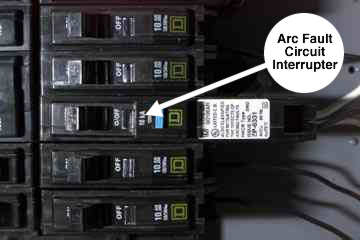 Arc-fault circuit interrupters (AFCIs) are special types of electrical receptacles or outlets and circuit breakers designed to detect and respond to potentially dangerous electrical short circuits in electrical wiring. How do they work? AFCIs function by monitoring the electrical circuit and promptly breaking or interrupting the electrical current in that circuit. They also are capable of distinguishing safe or normal arcs, such as those created when a switch is turned on or a plug is pulled from a receptacle, from arcs that can cause fires. An AFCI can detect, recognize, and respond to very small changes in wave pattern. What is an arc? When an electric current crosses an air gap from an energized component to a grounded component, it produces a glowing plasma discharge known as an arc. An automobile depends on an arc from the spark plug to ignite the fuel in the piston cylinder. Another example is a bolt of lightning. It is a very large powerful arc that crosses an atmospheric gap from an electrically charged cloud to the ground or another cloud. Just as lightning can cause fires, arcs produced by domestic wiring are capable of producing high levels of heat that can ignite their surroundings and lead to structure fires. Electrical problems are responsible for many structure fires every year. According to statistics from U.S. Fire statistics website as of 2013 there were well over one millions house fires per year but the number has steadily been declining. Much of the decline should be attributed to education and the use of safety devices such as AFCIs. Where are arcs likely to form? Arcs can form where wires are improperly installed or when insulation becomes damaged. In older homes, wire insulation tends to become brittle as it ages and is prone to cracking and chipping. Damaged insulation exposes the current-carrying wire to its surroundings, increasing the chances that an arc may occur. Situations in which arcs may be created:
Where are AFCIs required? Guidelines have been written into the National Code requiring the use of AFCIs in certain locations in new construction such as bedrooms. Since enforcement varies from one area to another it is recommended that you consult a licensed electrician for recommendations in your area. What types of AFCIs are available? AFCIs are available as circuit breakers for installation in the electrical distribution panel. Nuisance Tripping An AFCI might activate in situations that are not dangerous and create needless power shortages. This can be particularly annoying when an AFCI stalls power to a freezer or refrigerator, allowing its contents to spoil. There are a few procedures an electrical contractor can perform in order to reduce potential “nuisance tripping." Arc Faults vs. Ground Faults It is important to distinguish AFCI devices from Ground Fault Circuit Interrupter (GFCI) devices. GFCIs detect ground faults, which occur when current leaks from a hot (ungrounded) conductor to a grounded object as a result of a short-circuit. This situation can be hazardous when a person unintentionally becomes the current’s path to the ground. GFCIs function by constantly monitoring the current flow between hot and neutral (grounding) conductors, and activate when they sense a difference of 5 milliamps or more. Thus, GFCIs are intended to prevent personal injury due to electric shock, while AFCIs prevent personal injury and property damage due to structure fires. In summary, AFCIs are designed to detect small arcs of electricity before they have a chance to lead to a structure fire.
0 Comments
Your comment will be posted after it is approved.
Leave a Reply. |
Larry SelleckMy goal is to have a series of articles that deal with items that may be found on the home inspection report. There will also be articles on choosing a home inspector and a realtor. This information will be based on my experience in the construction industry as well as information I research. I welcome your comments. If you have a question or would like to see an article on a particular subject please ask. Categories
All
Archives
March 2019
|
|
L. A. Selleck Inspections and Consulting
22052 W. 66th St. Ste. 162 Shawnee, KS 66226 913-730-6402 and 785-640-5704 |
Serving The Entire Kansas City Area And Surrounding Towns And Communities Including, Lawrence, Topeka, Overland Park, Shawnee, Lenexa, Olathe, Tonganoxie, Leavenworth, Atchison, Holton, Manhattan, Gardner, Louisburg, Paola, and many others
|
Copyright © 2018
